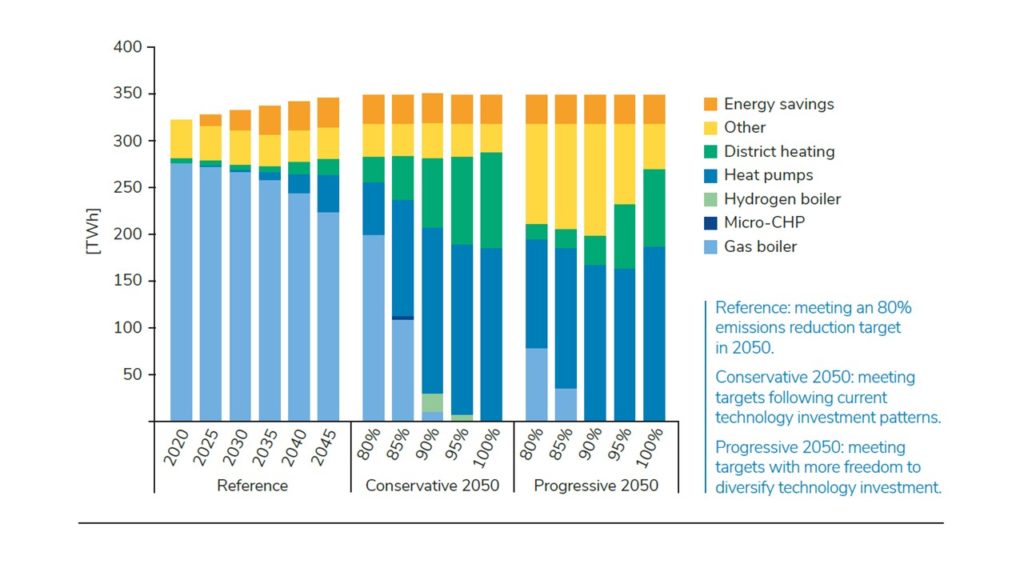The UKERC has just published an important paper by Jan Rosenow, Richard Lowes et al:
The Pathway to Net Zero Heating in the UK
Meeting the UK government's net zero emissions goal for 2050 will only be possible by complete decarbonisation of the building stock. There is uncertainty over the extent to which heating might practically be decarbonised and what the optimal technologies may be. This paper provides clarity about the pathways forward, focusing on the next 5-10 years.
Understanding the challenge
Almost all of the UK's 29 million homes will require upgrading by 2050. That is about 1 million homes a year, and is equivalent to more than 19,000 homes a week. Current retrofit rates are inadequate for achieving even a significant portion of the required level of decarbonisation to meet the 2050 target.
The replacement of fossil fuel-based heating systems is happening at an even slower pace. In 2018 only 27,000 heat pumps were installed in the UK and the vast majority of new build homes were connected to the gas grid. As a result, the proportion of homes heated by gas is increasing.
Energy efficiency and electrification: important solutions for clean heating
The well-established UK TIMES model was run to analyse UK futures that span both ambitious emission targets and more liberal technology investment options and includes two pathways, conservative and progressive (which explores increased freedom in choosing heating system options across the sector).
Results highlight the scale of change required in the residential sector. The graph below shows how the share of the technologies change with increasingly ambitious carbon reduction targets, depicting conservative and progressive scenarios, relative to 1990 levels.
Heat decarbonisation meeting different emissions targets:
Taken together, the results highlight the significance of the change that is needed to move towards the new net zero emissions target. Residential heat supplied via natural gas in 2050 is near halved for an 85% emissions reduction target and is non-existent beyond a 95% reduction. Instead, results suggest a dominant role for energy efficiency (termed conservation), community heating (in majority heat pump based), and individual air source heat pumps.
It is extremely unlikely that heat decarbonisation will be achieved without significant policy interventions. Fundamentally it is important to recognise that the speed and scale of the required heat transformation means that relying on consumer led schemes such as the RHI and the planned Clean Heat Grant are not sufficient. Incentives for consumers need to be part of a suite of policy measures based around skills, financial support and local area planning approaches.
Key findings:
- Current progress on heat decarbonisation is not commensurate with the rate of change required for Net Zero by 2050
- A combination of energy efficiency, heat pumps and district heating is the least-cost pathway for heat decarbonisation in the next 10 years
- The scale and speed of the transition means that decarbonisation progress for areas currently on the gas grid will be required before more about hydrogen is known
- The electricity system impacts of heat electrification can be reduced by smart operation of heating systems in well-insulated buildings
- Current policy ambition falls far short of delivering residential heat decarbonisation in line with the UK's net zero emissions target
We recommend that you read in full The Pathway to Net Zero Heating in the UK.
The report includes the following key paragraphs:
Research demonstrates that consumers still pay a lot more of the costs of the energy transition through their electricity bills than their heating bills, with gas carrying a much lower environmental and social policy cost burden than electricity, and having no carbon price applied.
This unequal sharing of costs between electricity and gas makes heat pumps less financially attractive because of the higher operating costs of heat pumps on standard (non-variable) tariffs. Unless consumers can see a financial benefit in the form of lower operating costs, it is unlikely that a modest upfront grant will provide sufficient incentive. Experience from countries such as Sweden and Finland shows that once fossil fuel heating is no longer the cheapest option the market changes rapidly.
See Fiscal Background: UK energy prices
See Renewable Heating See Renewable Cooling


